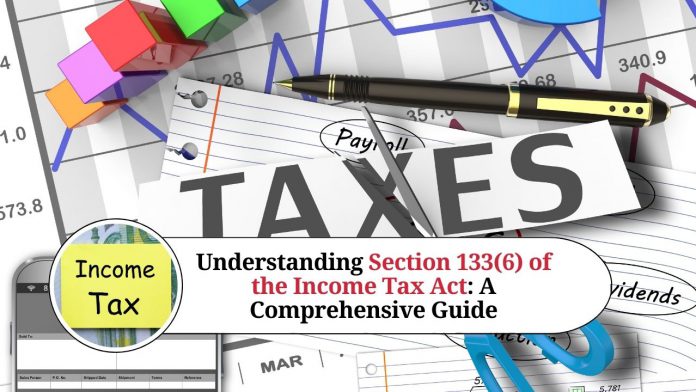Section 133(6) of the Income Tax Act is an important provision that gives income tax authorities the power to requisition books of accounts or other relevant documents to verify the income tax returns of taxpayers. The provision enables the authorities to issue a notice to any person or entity to produce any book or document, which may be useful or necessary for any inquiry or proceeding under the Income Tax Act.
Scope of Section 133(6)
The scope of Section 133(6) is broad and includes the power to requisition books of accounts, bills, vouchers, contracts, agreements, and other relevant documents. The provision also covers the power to inspect and make copies of such documents.
Limitations and Conditions
The power to requisition documents under Section 133(6) is not absolute. The provision is subject to certain limitations and conditions, which are aimed at safeguarding the interests of taxpayers and ensuring that the power is not misused or abused by the tax authorities.
The power to requisition documents can only be exercised for any inquiry or proceeding under the Income Tax Act. This means that the tax authorities cannot use this power for any other purpose outside the ambit of the Income Tax Act.
The power to requisition documents can only be exercised by an income tax authority who is not below the rank of an Income Tax Officer. This ensures that the power is not misused or abused by lower-level officials.
The notice should specify the books or documents that are required, and the time and place at which they are to be produced. The notice should also state the reasons for the requisition.
Appeal against Requisition
The person or entity who is served with a notice under Section 133(6) has the right to appeal against the requisition. The appeal can be made to the Commissioner of Income Tax (Appeals) within 30 days of the service of the notice.
Final Conclusion
In conclusion, Section 133(6) of the Income Tax Act is a powerful tool that enables the tax authorities to requisition books of account and other relevant documents to verify the accuracy and authenticity of tax returns filed by taxpayers. However, the power is subject to certain limitations and conditions, which ensure that it is not misused or abused by the tax authorities. Taxpayers must be aware of their rights and obligations under the provision to avoid any unnecessary legal hassles.
FAQs related to Section 133(6) of the Income Tax Act:
What is Section 133(6) of the Income Tax Act?
Section 133(6) of the Income Tax Act is a provision that gives income tax authorities the power to requisition books of accounts or other relevant documents to verify the income tax returns of taxpayers.
Who can exercise the power under Section 133(6)?
The power to requisition documents under Section 133(6) can only be exercised by an income tax authority who is not below the rank of an Income Tax Officer.
What is the scope of Section 133(6)?
The scope of Section 133(6) is broad and includes the power to requisition books of accounts, bills, vouchers, contracts, agreements, and other relevant documents. The provision also covers the power to inspect and make copies of such documents.
Can the power under Section 133(6) be misused or abused by the tax authorities?
The power to requisition documents under Section 133(6) is subject to certain limitations and conditions, which are aimed at safeguarding the interests of taxpayers and ensuring that the power is not misused or abused by the tax authorities.
What are the limitations and conditions under Section 133(6)?
The power to requisition documents can only be exercised for any inquiry or proceeding under the Income Tax Act. The notice should specify the books or documents that are required, and the time and place at which they are to be produced. The notice should also state the reasons for the requisition. The person or entity who is served with a notice under Section 133(6) has the right to appeal against the requisition.
What is the process for appealing against a notice under Section 133(6)?
The person or entity who is served with a notice under Section 133(6) can appeal against the requisition to the Commissioner of Income Tax (Appeals) within 30 days of the service of the notice.
Can a taxpayer refuse to comply with a notice under Section 133(6)?
If a taxpayer refuses to comply with a notice under Section 133(6), they may face legal consequences, including penalties and fines. It is advisable to comply with the notice and produce the relevant documents, as required by the income tax authorities.




















